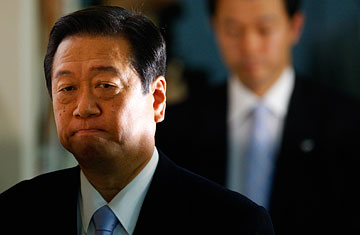
Japanese opposition leader Ichiro Ozawa leaves a news conference at the Tokyo headquarters of the Democratic Party after resigning on May 11, 2009
At a Tokyo press conference on May 11, Ichiro Ozawa, leader of Japan's main opposition party, looked refreshed and smiling. Someone in the crowd yelled, "Don't quit!" but everyone gathered at the headquarters of the Democratic Party of Japan knew that Ozawa, who has led the DPJ since April 2006, had already made up his mind. After a few moments the 66-year-old party president took the podium to announce that he will step down as early as May 13. "I made up my mind that I'd like to solidify the unity at the DPJ and to strengthen it further by stepping down," said Ozawa. "To win is the reason for my decision."
Ozawa's resignation will appease those within his party who have called for a clean start since a DPJ political funding scandal broke in early March. Fellow DPJ members and lawmakers of the ruling Liberal Democratic Party (LDP) have criticized Ozawa for his handling of the scandal, which involved years of contributions from Nishimatsu Construction, a company with that had ties to Ozawa's fund-raising organization, Rikuzankai. The brouhaha has already led to the arrest of Ozawa's chief secretary for violating political laws, though Ozawa himself has denied any wrongdoing. But the scandal has divided the party and Ozawa's departure enables the DPJ to reinvigorates its chances at the next general election, which must take place in the next few months. (See pictures of Japan and the world.)
As 2009 began, the opposition DPJ was actually leading the LDP in the polls. The Japanese government's handling of the economic crisis — in addition to an embarrassing incident at the G7 in Rome involving then-Finance Minister Shoichi Nakagawa — were hurting Prime Minister Taro Aso's administration. The DPJ hoped it might finally be in a position to beat the ruling party, which has enjoyed nearly uninterrupted rule since its founding in 1955.
But the funding scandal changed all that. In a Mainichi Shimbun newspaper survey in April, 72% of respondents said that Ozawa should resign over the political fundraising scandal. A Yomiuri Shimbun newspaper poll over the weekend showed little improvement: 71% of people wanted Ozawa gone. Aso's approval rating, meantime, is rising again. (Read: "A Reprieve for Japan's Embattled Leader?")
Did the LDP orchestrate Ozawa's downfall? Says Gerald Curtis, a political professor at Columbia University who has written extensively on Japan: "If that's what they wanted, they succeeded."
Now the DPJ has to rebuild. "This [Ozawa's resignation] is the first step that the DPJ needed to take to try to recover its popularity and to stand a chance at winning the election," says Curits. "They would have not had a chance if he'd stayed on." Curtis says that Ozawa botched the handling of the scandal because he didn't come out to the public about his relation with the construction firm. "He put himself into a bad box. Quitting was essential," he says. "Now the next step is not only who [the DPJ] chooses but how they choose."
There is a lot riding on Ozawa's successor. "The upcoming election will be a once-in-a-lifetime chance for the Japanese people to select a government and to save this country," Ozawa said at his press conference. The election, he added, will be the DPJ's best and "biggest chance to realize a change of government." Potential new heads of the DPJ include acting President Naoto Kan, who has led the DPJ in the past. Secretary General Yukio Hatoyama, another potential candidate, has also announced he will resign, but not before scheduling the party's presidential election. The most likely choice, however, is DPJ deputy leader Katsuya Okada, 55, a strong party president in 2004 and someone who appeals to the younger generation of Japanese. Curtis says it is now critical that Ozawa steer clear of the process to allow the party to choose someone who is "independent and appealing". (See pictures of Japanese design.)
Stepping out of the spotlight might be what Ozawa has intended all along. After working behind the scenes of government for decades (having first entered politics 40 years ago), Ozawa knows more than most politicians that being in a position to get what you want is not synonymous with being at the center of attention. And what Ozawa wants is for the DPJ to win. During an interview in early March, in response to whether he wanted to be prime minister, Ozawa told TIME, "I don't like to be showy on the stage." In his reform-minded 1994 book "Blueprint for a New Japan", Ozawa writes, "In Japan, 'taking responsibility' all too often means resigning as soon as the results are known. But this is wholly inappropriate." Now he's resigned, not to take the blame, he says, but to unite the party.
—With reporting by Yuki Oda / Tokyo
